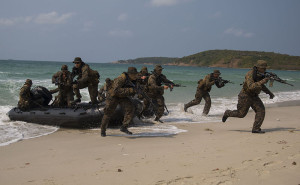Will Cobra Gold 2015 turn the tide in Thai- US relations?
May 22nd Coup of 2014 The second military coup in a decade, the May 22nd coup has brought massive changes within Thailand during the past year. Opposition parties, mainly consisting of the elite ruling class, have sought to diminish the Shinawatra administration. Popular democracy was overthrown as the military stepped in after Thaksin Shinawatra Yingluck was removed from her ministerial status by the country’s top constitutional court under the name of power abuse. Thailand is still under martial law and its military junta has not shown intentions to relinquish its power. Since then, the military has taken control of Thailand’s economy despite protests from the U.S.
Response to the Coup
Following the coup, the U.S. had cut off military assistance and the European Union had also suspended trade negotiations with Thailand. Although the military has been successful in stabilizing Thailand’s economy, larger private investment and domestic consumption could possibly shake Thailand’s economy in 2015.
The Military’s Response
Following the military and economic sanctions, the military has boosted its ties with China in order to enhance its economy. China, already Thailand’s largest trading partner, has further strengthened its ties by providing political support. “China will not intervene in Thailand’s politics but will give political support and help maintain relationships at all levels. This is China’s policy,” Thailand’s defense minister Prawit Wongsuwan stated.

Thai-US Relations
The coup has further soured Thailand’s relationship with the US. Thailand has enjoyed close relations with the United States. During the Cold War, Thailand was one of the US’s allies in Southeast Asia. Many Thai royalists feel abandoned by the US. However, the US State Department has declared that they will be using ‘every political lever, economic lever where applicable’ to pressure the military regime to return Thailand to democratic rule.
Khunying Songsuda Yodmani, daughter of former pro-US military dictator Thanom Kittikachorn, responded by asking the US to not ‘meddle’ in Thailand’s affairs and to ‘respect its allies and treat them as equals rather than its colonies.’ The souring relationship between the Thai royalists and the US dates back to 2012 when President Obama expressed his support for the elected Shinawatra administration.
The junta snubbed the US again after has given the US another slap in the face by teaming up with China and by declared that there are other business partners who are willing to do business without concerns over the country’s internal politics. Prawit, the brother of General Prayuth, head of the National Council for Peace and Order (the junta), also stated that China and Thailand had agreed to joint military exercises between their air forces and to expand “overall military cooperation” within the next three to five years.
Cobra Gold 2015
Cobra Gold, one of the largest US-led annual multinational military exercises in the world recently kicked off in Thailand on February 9. The Pentagon is sending 3600 troops to Thailand to participate in this major military exercise despite the Obama administration’s suspension of aid to the country. Exercises include civic assistance programs and jungle survival training such as eating scorpions, capturing cobras in the wild, and recognizing edible jungle fruits in underdeveloped regions of Thailand.
Last year, 13,000 troops from the US, Thailand, Japan, Indonesia, Malaysia, South Korea, and China participated in military exercises and humanitarian objects. This year’s Cobra Gold has been viewed controversially due to the tensions rising in the region. The US decided to scale down but continue with the 2015 Cobra gold in order to signal its disapproval of the coup. However, it still wants to maintain a relationship with the rest of the Thai people. The US wishes to continue expressing its commitment to the Asia-Pacific. Whether Cobra Gold will reinforce ties or further increase tensions between the two nations remain in uncertainty.
